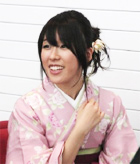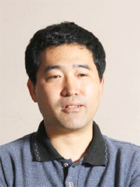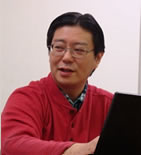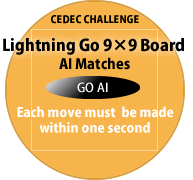TOP![]() Events
Events![]() CEDEC CHALLENGE
CEDEC CHALLENGE![]() Lightning GO 9×9 Board AI Matches
Lightning GO 9×9 Board AI Matches
CEDEC CHALLENGE
* You can access CEDEC CHALLENGE with any of the audience passes, including the EXPO PASS.
Information on CEDEC CHALLENGE:
Lightning GO 9×9 Board AI Matches
CEDEC 2011 continuously includes various competitive events collectively referred to as the "CEDEC CHALLENGE." The CEDEC CHALLENGE for programming will again feature the game of Go where matches are held between two AI (artificial intelligence) programs. We are currently soliciting AI programs from the general public. The event is organized to improve development of computer entertainment including video game development technologies and to promote the development of relevant human talents through competition. Please also refer to CEDEC 2010 results at http://cedec.cesa.or.jp/2010/event/challenge/ai/entry.html (in Japanese) among with the explanations below.
General guidelines
The preliminary and final matches will be held from 9/6 to 9/8/2011 at the CEDEC 2011 in Pacifico Yokohama conference center. The top four programs short-listed in the preliminary rounds will advance to the tournament-style final matches. The winning program will have an exhibition match against Professional Go Player. All source code and documentation for participating programs will be available to the general public on CEDEC's server.
General rules
The matches will be organized in the form of automatic pairings between Go AI programs running on a single PC using GoGui (Go-playing software). Therefore, your program must support GTP (Go Text Protocol) and run on GoGui. Please verify that your program run on GoGui (Free software) prior to entry.
In order to have all participants concentrate on algorithm programming of GO AI, we will provide a technical information page with various reference information of GO AI, including information such as "how to match your program against computer on GoGui," and "how to support GTP (with sample programs)" (Link to the page will be added at a later date)
Please be aware that your program will be executed on a PC prepared by CEDEC (Fujitsu LIFEBOOK A550/B / Windows 7 Professional (32bit) / Core i5-560M (2.66GHz) / 4GB RAM / 160GB HDD)
The source code for the AI programs must be stored in advance on a predetermined file server in the form of buildable source code. Prior to a Go match, the source code will be downloaded to the PC and compiled by the CEDEC Steering Committee. If a team's code does not compile they will lose the match.
All matches will take place on 9x9 boards, and each move must be made within one second. A match is considered to have ended when either of the programs does not make a move within one second or makes an illegal move.
Each match continues for up to two minutes. If a match does not end within this time limit, a judge determines the winner on the basis of the position on the board. A judge will formally determine the winner even when a match ends within the two minute time limit.
The Japanese rules of play will be used.
Program development environment
On GoGui, you can download advanced, GTP-supported Go Programs (such as GNU Go) and have your program play against them. (Please refer to Technical support page for details.) By using the program, participants can test programs by playing them against existing computer AI programs. The running environment is limited to Windows 7 32-bit.
Deliverables
Please provide the program's source code, data, libraries, as well as a document specifying its build environment and an executable file. The executable file here will solely be used for pre-testing by Steering committee. CEDEC Steering committee will use a package created from the submitted, buildable source code on preliminaries and final matches and the package will also be released to public.
Please also prepare and submit a summary document to plainly describe the Algorithm. The document should be one sheet of A4 paper or longer, and it will be displayed at the exhibition venue and released to public later. Please keep your description as plain as possible, as our target readers may not have technical background. There is no defined template for this but documents for "Nomitan" (in English), "LCHAN" (in Japanese) from CEDEC 2010 may be good examples.
Entry period
From May 9th to July 29th 2011. (you can continue developing and uploading your programs until just before the start of CEDEC 2011).
Entry method
Please e-mail us at cedec_ai@cesa.or.jp for detailed information and enquiries.
Entry fee for this challenge isFREE!
All entrants must, by 8/19 (Friday), submit their program packages to the server which is hosted by CEDEC. Only those programs validated by the CEDEC Steering committee will be allowed into the preliminaries. (If there are too many applicants, the committee will then further select which programs to allow.)
To participate in the preliminaries, please come to the reception desk at the conference hall on the morning of 9/6 (Tuesday, the first day of CEDEC). There, each entrant will be given a full conference pass. In the case of teams, up to three exhibition passes will be given for the other team members.
For the latest information, please also visit CEDEC Official website.
We sincerely look forward to your participation.
List of supporters of Lightning GO 9×9 Board AI Matches
WANG Wei jen, 5-dan Professional Go Player

Born in 1977 in Taiwan
Migrated to Japan at the age of 12
Completed his master's degree at the Graduate School of Oberlin University
Actively involved in promoting Go as a director of the Go promotion project "IGO AMIGO"
Instructor, Junior Go School, Nihon Ki-in
Instructor, Go Class conducted by Umezawa Yukari, WANG Wei jen, and Kana Mannami
Instructor, Open College, Oberlin University
Kana Mannami, 4-dan Professional Go Player

Born in 1983 in Hyogo
Won the Women’s Kisei title in 1994 and 1996
Actively involved in promoting Go as a representative director of the Go promotion project "IGO AMIGO"
Appeared on many TV programs, including the NHK Go Cup and "NHK IGO Kouza" (NHK IGO course), where she was a moderator
Instructor, Go Class conducted by Umezawa Yukari, WANG Wei jen, and Kana Mannami
Younger sister Nao Mannami is also a 2-dan professional Go player.
Books
"Mannami Kana No IGO Nyumon" (Mannami Kana's Introduction to IGO) (Nitto Shoin)
"Mannami Shimai No Gungun Tsuyokunaru IGO Q&A" (Mannami Sister's Present—Q&A for Rapid Progress in Go) (Mainichi Communications)
"Mannami Kana No IGO Jotatsu Handbook" (Mannami Kana’s Handbook for Mastering Go) (Mainichi Communications)
Masakazu Muramatsu, Professor

Doctor of Philosophy
Department of Communication Engineering and Informatics, Faculty of Informatics and Engineering, The University of Electro-Communications
Born in 1965 in Tokyo
Majored in optimization theory and started research on computer Go around 2005
Planning and participating in events in which computers are pitted against professional players, such as the Go UEC Cups and FIT2008
Vice-chairman, Computer Go Forum (CGF)
Secretary, The Special Interest Group on Game Informatics, Information Processing Society of Japan
Takeshi Ito, Assistant Professor

Doctor of Engineering
Department of Communication Engineering and Informatics, Faculty of Informatics and Engineering, The University of Electro-Communications
Born in 1964 in Aichi
Engaged in research on players' thought and cognitive processes such as learning, especially in the context of Go and Shogi, and on enjoyable match-up games.
Also engaged with planning and implementing thought-based-game competitions such as the Computer Go UEC Cup and Mini-shogi competitions. Contributed to Akara's victory on match against women's Osho champion Shimizu Ichiyo in 2010 by proposing "Consultation Algorithm".
Project member, "Project to win top-professional Shogi Player", Information Processing Society of Japan
Chief, Cognitive Science and Entertainment Research Station
Director, Computer Shogi Association (CSA)
Director, Computer Go Forum (CGF)
(The above information is up-to-date as of May 28, 2010.)
In cooperation with IGO AMIGO , Computer Go Forum (CGF) and FUJITSU LIMITED




